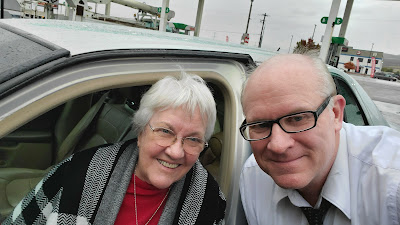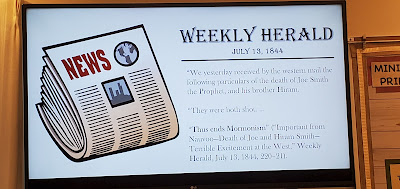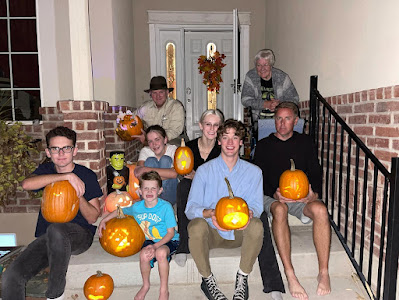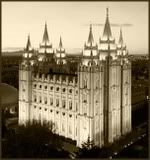Traces of Time . . .
To see last week's blog post--scroll down to the end of this week, then October 18-October 24, 2021 will be there. If it's not, hit "Older Posts" at the bottom right.

Warren Foote, in his field cutting wheat when wife came and told him Joseph and Hyrum shot...we felt the Lord had forsaken His people.
"Individually and collectively the Twelve hold the keys."
In 1820 in Denmark, Bert Thorvaldsen, put these words
{I added this info from Wikipedia because I didn't know the full name of the artist/sculptor of The Christus.}
Christus (also known as Christus Consolator) is a 19th-century Carrara marble statue of the resurrected Jesus by Bertel Thorvaldsen. It is located in the Evangelical Lutheran Church in Denmark's Church of Our Lady in Copenhagen, for which it was commissioned as part of a larger group, which includes the apostles.] On the left below, each side has six of the Lord's Twelve Apostles (except Paul is put in place of Judas Iscariot).
The mantel of the Prophet Joseph Smith fell upon Brigham Young. Many heard the voice of Joseph Smith, and saw the countenance of Joseph Smith fall upon Brigham Young as he was speaking to them that day and knew by the power of the Holy Ghost who the true leader should be.Joseph Smith

Brittany, Sue.
Heather, Eileen.
today
I tried to find what city the newspaper was in that was in the power point today...and this came up:
"What newspapers in the 1800s said about the martyrdom
of Joseph and Hyrum
By Jannalee Sandau June
27, 2020
Lead image from Wikimedia Commons: Statue of Joseph and Hyrum Smith on their way from Nauvoo, Illinois to the Carthage Jail. Located in front of the Nauvoo Illinois Temple. This 2003 sculpture is by Stanley J. Watts (human figures) and Kim Corpany (horses).
This story originally ran on LDS Living in 2017.
Most members of the Church are familiar with the events
surrounding the death of the Prophet Joseph Smith and his brother Hyrum, but
what they might not realize is that news of their murder made headlines all
across the country, from Arkansas and Connecticut to Florida and Maine. And
though many didn't believe Joseph was a prophet, the majority of these media
sources condemned the act as murder and a scandal.
As we remember the anniversary of this tragic moment in
Latter-day Saint history, here's a look at a few of the reactions of newspapers
across the country:
The New York Sun reported, "It is no small thing, in the blaze of this
nineteenth century, to give to men a new revelation, found a new religion,
establish new forms of worship, to build a city, with new laws, institutions,
and orders of architecture, to establish ecclesiastic, civil and military jurisdiction,
found colleges, send out missionaries, and make proselytes in two hemispheres:
yet all this has been done by Joe Smith, and that against every sort of
opposition, ridicule and persecution."
The New York Weekly
Herald added, "Thus died the plowboy Prophet of
America at the hands of an assassin, the object of intense, local persecution
within Hancock County, where feeling ran high in the communities of Carthage
and Warsaw against Nauvoo, its balance of power and the Prophet. Yet, out
beyond the vineyards of Hancock County, beyond that beautiful bend in the
Mississippi, he was a respected and an admired Prophet and statesman."
An article in the Herald of Freedom in Concord, New Hampshire stated,
“. . . but I do not put the slightest confidence in the stories told of him by
our political and religious presses. They tell as bad stories of the
abolitionists as they do of Smith. They are not entitled to any credit. . . As
to the Mormons, I would say here, that though I know nothing of their religion,
or character, I venture to guess they are both better—or at least as good, as
those of the ruffians who killed them—or the other ruffians who virtually back
them up in it” (pg 697).
There were several other papers, including, of course, the
Church-run Times and Seasons and the Nauvoo Neighbor,
who also put Joseph Smith in a more favorable light. In talking about the
funeral procession, the Times and Seasons reported “It was a
vast assemblage of some 8 or 10,000 persons, and with one united voice resolved
to trust the law for a remedy of such a high-handed assassination, and when
that failed, to call upon God to avenge us of our wrongs! Oh widows and
orphans! Oh Americans, weep, for the glory of freedom has departed!”
A piece printed in the Daily Evening Transcript in Boston, Massachusetts,
seemed to reinforce a prophecy given to Joseph Smith by the angel Moroni that
his name would be shared for good or for evil around the world:
“Joe Smith is dead and gone. He was one of the most remarkable
men of the age. The time for writing his history has not arrived. Men who have
known him long and well, differ in their estimate of his character; the future
historian alone can reconcile the contradictory statements of his friends and
enemies, and place him in his true position. The personal manners of every man
make him friends or enemies, regardless of his principles and of his conduct.
This remark is clearly illustrated in the case of Smith. He was a man of rough
exterior and course manners, thousands who approached him were so completely
disgusted at once by his manners, that they refused to look at the good he
claimed to have done. But notwithstanding this he was a remarkable man, and has
left the impress of his genius upon the age in which he lived; he has carved
out for himself a title to a page in the history of his country, and his name
will be remembered, for good or for evil, when the names of half the ephemeral
Statesmen of the age will be forgotten. . . “He was a man of genuine courage,
and would have fought to the last moment of his life. He was pursued by a band
of three hundred infuriated demons, and cruelly shot down like a wild beast,
while confined in a small room where he could not escape. It was a glorious
exit for him. Whatever there was of evil in his heart will be forgotten in the
recollection of his death. He will be eulogized by his disciples, and worshiped
as a God. Time and distance will embellish his life with new and rare virtues,
and more than earthly power; his doctrines will flourish, his influence will
extend to ages yet unborn, and future generations will celebrate his birth and
death by public festivals, public prayers, and an unlimited devotion [signed]
H. J.” (pg. 668-671, emphasis added).
The news even spread in Europe. The Portland Transcript in Maine shared part of a story
printed in the Liverpool Mercury: “The scenes which have taken
place in Pennsylvania and Illinois would have disgraced a nation of savages. We
question whether. . . any record can be found more sanguinary than the riots at
Philadelphia, or the massacre of the Mormon leader and his brother, in the
prison at Carthage” (pg. 661).
On the other extreme, some papers, such as the Jonesborough Whig,
thoroughly supported the actions of the mob, praising the murders as a victory:
"Some of the public Journals of the country, we are sorry to see, regret the
death of that blasphemous wretch Joe Smith, the Mormon Prophet. Our deliberate
judgement is, that he ought to have been dead ten years ago, and that those who
at length have deprived him of his life, have done the cause of God, and of the
country, good service."
Reverend Brownlow did not hide his enthusiasm when he concluded,
"Smith was killed, as he should have been. THREE CHEERS to the brave
company who shot him to pieces!"
The New York Herald even went so far as to say that "The death of the
modern mahomet will seal the fate of Mormonism. They cannot get another Joe
Smith. The holy city must tumble into ruins, and the 'latter-day saints' have
indeed come to the latter day." Others also spoke out against Joseph,
calling his death the end of the “great deceiver, who has no doubt, seduced and
ensnared numbers to their ruin” and claiming he would be remembered for his
“deeds of darkness.”
Still others took a middle ground, denying Joseph’s standing as
a prophet, but speaking out against his death in defense of a fair trial: “It
will probably never be known who shot Joseph and Hyrum Smith—but their murder
was a cold-blooded cowardly act, which will consign the perpetrators if
discovered to merited infamy and disgrace. They have broken the pledges to the
Government—disgraced themselves and the State to which they belong. They have
crimsoned their perfidy with blood. . . It will long be regretted that things
have taken the turn they have in relation to the Mormons” (Quincy Herald).
The Lee County Democrat in Fort Madison, Iowa, added, "The murder of Jo Smith
and his Brother has caused feelings of deep regret in the breasts of every
peaceable and law-abiding people; they look upon it as a high-handed outrage,
and as a cruel, cold-blooded, cowardly and contemptible murder. That Jo and his
brother were guilty of acts which required the interposition of the law, we are
well aware, but after he and his brother had voluntarily surrendered themselves
up to justice, under the full assurance that they would receive the protection
of Governor Ford from all violence; they were entitled to all protection
against all danger and all enemies" (pg. 659).
Though these are just a few of dozens of comments made about the
death of the Prophet and his brother Hyrum, they show the wide range of
influence the gospel of Jesus Christ, as restored by Joseph Smith, had and
continues to have in the world. Despite the Church's small numbers and the fact
that most people did not believe that Joseph Smith was a prophet, many people
knew who the Latter-day Saints were, and believed that the deaths of Joseph and
Hyrum Smith were unjust.
Ultimately, the description Latter-day Saints will remember best
is now recorded in our scriptures, penned by Elder John Taylor in D&C
section 135 verse 3:
"Joseph Smith, the Prophet and Seer of the Lord, has done
more, save Jesus only, for the salvation of men in this world, than any other
man that ever lived in it. In the short space of twenty years, he has brought
forth the Book of Mormon, which he translated by the gift and power of God, and
has been the means of publishing it on two continents; has sent the fulness of
the everlasting gospel, which it contained, to the four quarters of the earth;
has brought forth the revelations and commandments which compose this book of
Doctrine and Covenants, and many other wise documents and instructions for the
benefit of the children of men; gathered many thousands of the Latter-day
Saints, founded a great city, and left a fame and name that cannot be slain. He
lived great, and he died great in the eyes of God and his people; and like most
of the Lord’s anointed in ancient times, has sealed his mission and his works
with his own blood; and so has his brother Hyrum."
Traces of Time . . .
********************************* Tonight was the Ward Chili Cook-Off and Carnival...and costume contest...
...helped create a spooky, eerie feeling!
Wish I'd gotten a photo of Parry from the front
Lots of families came...
Ward Chili Cook-Off and Carnival
Ward Chili Cook-Off and Carnival
Ward Chili Cook-Off and Carnival
Ward Chili Cook-Off and Carnival
Ward Chili Cook-Off and Carnival
Ward Chili Cook-Off and Carnival
Ward Chili Cook-Off and Carnival
Ward Chili Cook-Off and Carnival
Ward Chili Cook-Off and Carnival
Ward Chili Cook-Off and Carnival
Ward Chili Cook-Off and Carnival
Ward Chili Cook-Off and Carnival...
The nice waitress took this of everyone.
Then a nice fellow took this of everyone outside.
The Blob is a 1958 American science fiction horror film directed by Irvin Yeaworth, and written by Kay Linaker and Theodore Simonson. It stars Steve McQueen (in his feature film debut) and Aneta Corsaut and co-stars Earl Rowe and Olin Howland. It was distributed by Paramount Pictures as a double feature with I Married a Monster from Outer Space.
The film concerns a growing, corrosive, alien amoeboidal entity that crashes to Earth from outer space inside a meteorite. It envelops everything in its path in the small communities of Phoenixville and Downingtown, Pennsylvania, growing larger, redder, and more aggressive, eventually becoming larger than a building.
Happy Trick or Treating day.
Happy Trick or Treating day.
Happy Trick or Treating day.
Happy Trick or Treating day.
Happy Trick or Treating day.
Happy Trick or Treating day.
Happy Trick or Treating day.
Happy Trick or Treating day.
Happy Trick or Treating day.
Happy Trick or Treating day.
Happy Trick or Treating day.
Happy Trick or Treating day.
Happy Trick or Treating day.
Happy Trick or Treating day.
Happy Trick or Treating day.
Happy Trick or Treating day.
Happy Trick or Treating day.
Steve and Carter came to watch the football
Shootouts aren’t Kalani Sitake’s style,
but 66-49 win over Bronco Mendenhall and Virginia was satisfying just the same
By Jay Drew Oct 31,
2021, 2:06am MDT
Cougars took down the high-flying Cavaliers in the so-called Bronco by racking up 734 yards and 66 points at LaVell Edwards Stadium
Before his much-publicized and ballyhooed return to BYU,
Virginia football coach Bronco Mendenhall said Monday that he would
prefer a score in the teens to something in the 40s.
Mendenhall could never quite get what he wanted in Provo — which
is partly why he left after going 99-48 in 11 seasons — but Saturday’s result
in the so-called Bronco Bowl hammered home that point to almost ridiculous
lengths in front of 57,685 fans at LaVell Edwards Stadium.
In a game pitting two of the best defensive coaches ever
produced by the Beehive State — Mendenhall and his successor at BYU, Kalani
Sitake — Edwards’ style of offense naturally won the day.
It was the 600th win in BYU history, and few have been as memorable, what with Mendenhall returning and both teams entering with 6-2 records and on upward trajectories.
After 1,322 yards were gained and 115 points scored, Sitake’s Cougars were left standing with a 66-49 win that almost certainly will vault AP No. 25 BYU into the College Football Playoff rankings when they are released for the first time in 2021 on Tuesday, Nov 2.
Halloween
Celebration
Description
Halloween or Hallowe'en, less commonly known
as Allhalloween, All Hallows' Eve, or All Saints' Eve, is a celebration
observed in many countries on 31 October, the eve of the Western Christian
feast of All Hallows' Day. Wikipedia
 | ||
| Do what you can, with what you have, where you are.-- Squire Bill Widener | ||
| This line was made famous by President Theodore Roosevelt, but he was actually quoting a Virginian soldier and community leader named Squire Bill Widener. Published in Roosevelt’s 1913 autobiography, this succinct quote summarizes the former President’s philosophy on life: that devotion to the pursuit of mere pleasure and success is hollow in comparison to a life lived dutifully for the people right in front of you. “Why, the greatest happiness,” Roosevelt wrote, “is the happiness that comes as a by-product of striving to do what must be done.” |
The Bible is "the Word of God as far as it is translated correctly" and is a Testament of the Divinity of Jesus Christ.
Traces of Time . . . (To see last week's blog post--scroll down to the end of this week, then October 18-October 24, 2021 will be there. If it's not, hit "Older Posts" at the bottom right.
The Bible is "the Word of God as far as it is translated correctly" and is a Testament of the Divinity of Jesus Christ.



































































































































































